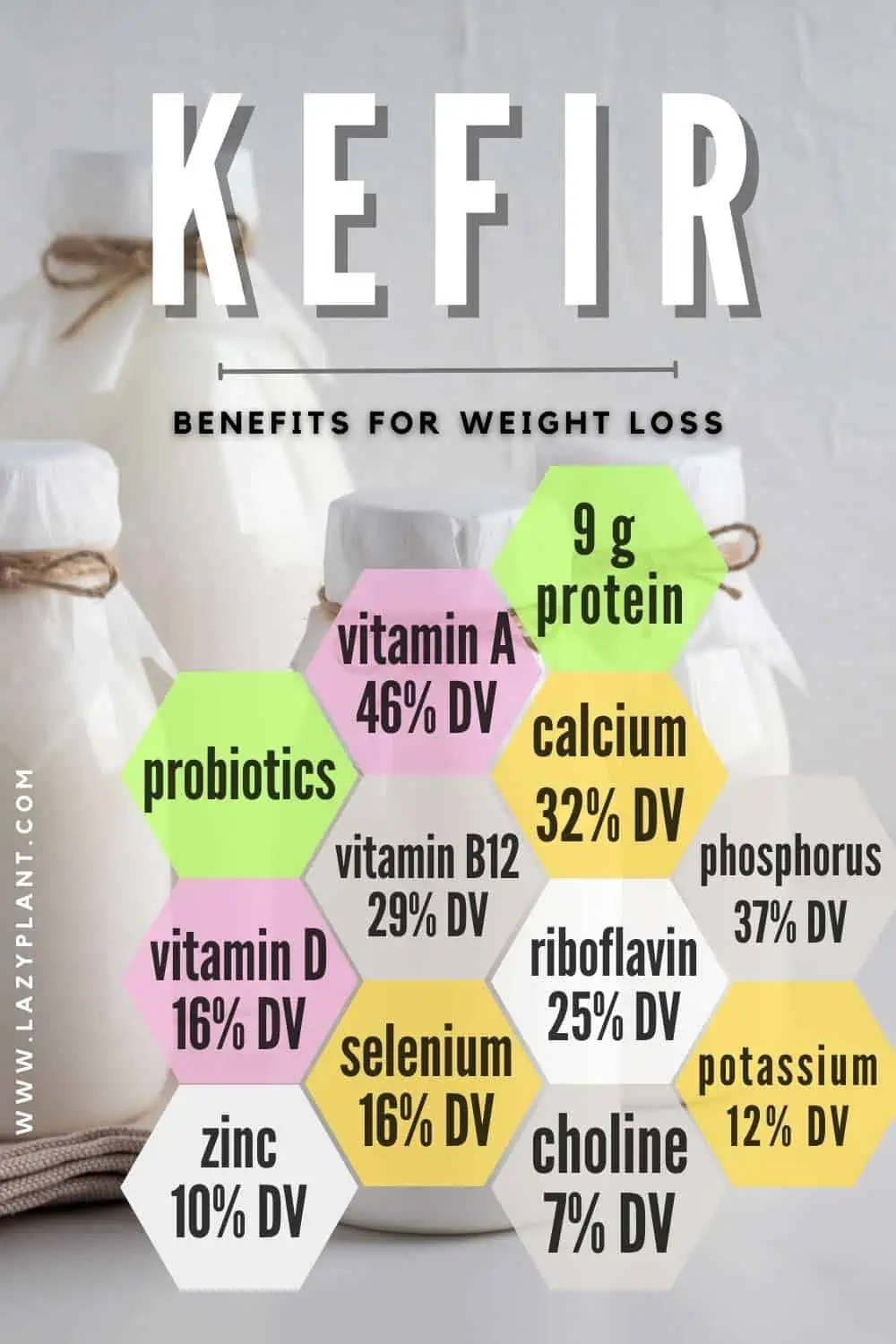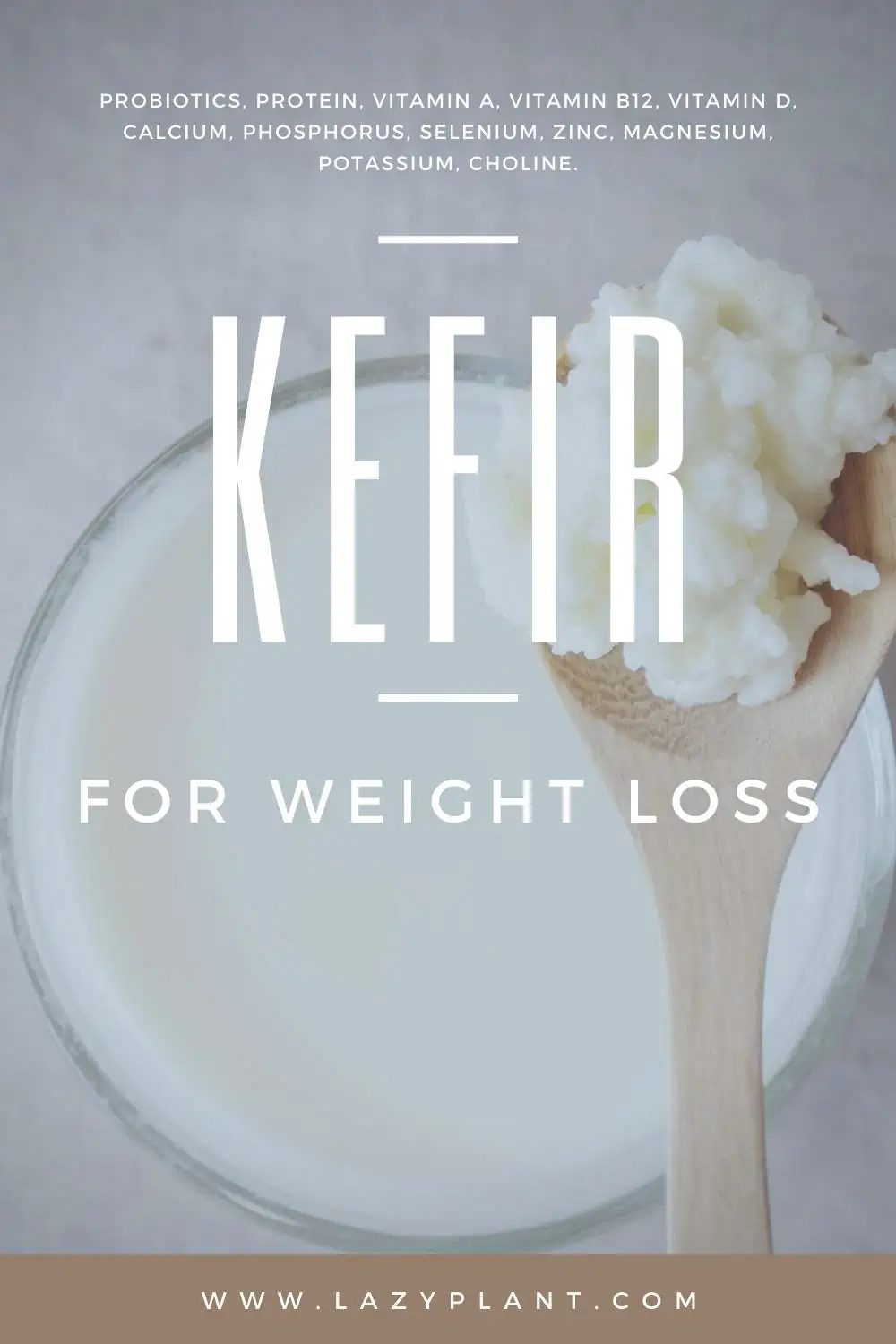A cup of low-fat kefir a day supports weight loss. Probiotics, vitamins, electrolytes, and protein in kefir help promote satiety, increase energy expenditure, burn fat, improve glucose status, and preserve precious muscle mass!
What’s kefir?
Kefir is fermented milk that tastes a lot like yogurt. Most commonly, it’s made by adding kefir grains to cow’s milk. Kefir grains are a mix of beneficial bacteria and yeast.
These probiotic strains contribute to the fermentation process and can have health benefits when consumed.
Probiotics are good for gut health. They help maintain a balanced gut microbiota. As a result, kefir may support digestion, and potentially boost the immune system!
Kefir can have a couple of dozens of probiotics, depending on the specific kefir grains used, the fermentation conditions, and the source of milk. Refer to the product’s label for the exact composition of probiotics in kefir.
Benefits of kefir for weight loss!
Kefir supports weight loss for two reasons:
- It’s the most common fermented beverage that promotes the health of gut microbiota.
- Moreover, it’s packed with protein, vitamins, and electrolytes that help maintain a lean physique, and burn body fat.
Promotes satiety
Above all, kefir supports weight loss because it promotes satiety.
Protein
Firstly, kefir is rich in protein. A cup provides more than 9 grams of highly bio-absorbable protein.[1]
High-protein diets enhance weight loss because protein:
- prevents loss of muscle mass while dieting. Increased muscle mass supports high basal metabolism.
- has the highest thermic effect: 20-30% of calories of protein are burned during digestion.
- meals high in protein, fiber, and water have the highest satiety index![2]
Gut microbiota
In addition, kefir may affect the feeling of fullness, as it improves gut health.
Healthy gut microbiota seems to manage satiety and energy intake. Also, it may protect from metabolic diseases, like obesity.[3]
In fact, appetite isn’t regulated only by the stomach. Bacteria in the gut appear to play a key role as well.[4]

How to drink kefir for weight loss?
A high fiber intake is also crucial for gut microbiota ecology. It directly interacts with gut microbes, enhancing gut health.
In addition, fiber controls appetite, as it delays the digestion of food.
Kefir has no fiber, though.
Hence, drinking a cup of kefir at breakfast or brunch with fiber-packed foods, like oatmeal, muesli, or granola, can help us consume significantly fewer calories in a day.
Helps burn belly fat
In addition, kefir can play a key role in weight loss because it’s very nutritious. It contains various vitamins and minerals that are involved in protein, glucose, and fat metabolism.
It’s packed with nutrients
A cup of low-fat kefir contains:
- vitamin A, 46% DV. Among its countless health benefits, vitamin A improves metabolism and glucose tolerance.
- vitamin B12, 29% DV. It’s involved in energy metabolism. Low levels have been associated with obesity. Obese people are more likely to have low serum vitamin B12 concentrations. Milk is the main vitamin B12 source for many people.[5]
- vitamin D, 16% DV. Maintaining normal levels of vitamin D is crucial while following a hypocaloric diet for weight loss. It seems to have a huge impact on body composition.
- phosphorus, 37% DV. Meals high in phosphorus appear to enhance weight loss because phosphorus enhances energy expenditure and manages appetite.[6]
- riboflavin, 25% DV. This is another beneficial B vitamin for weight loss. Obese people should be very mindful of getting adequate amounts.

- pantothenic acid, 19% DV. This B vitamin regulates glucose levels, inhibits fat accumulation, and increases energy expenditure![7]
- selenium, 16% DV. Selenium has protective effects against obesity as well as many other chronic diseases. Also, it supports muscle gain.[8]
- vitamin B6, 11% DV. It’s vital for maintaining a lean body year-round, as it’s implicated in more than 100 enzymatic reactions!
- zinc, 10% DV. Zinc may play an effective role in the treatment of obesity as well. Among other health benefits, it manages appetite, improves insulin resistance, and fights inflammations.[9]
- choline, 7% DV. High choline intakes have been associated with a lower body fat percentage and body mass index. However, most people consume less choline than the recommended daily intake from food.
- thiamine, 6% DV. Consuming foods rich in thiamine is important while dieting. About 30% of obese people are deficient in thiamine.
Keeps the body well-hydrated
Furthermore, kefir has beneficial effects on weight loss because it hydrates the body. The body has to be well hydrated in order to burn fat. Also, a well-hydrated body has improved insulin sensitivity.[10]
Above all, kefir hydrates the body, as it’s almost 90% water.
Moreover, kefir is an excellent dietary source of electrolytes. Replenishing lost electrolytes is as important as replenishing fluids. A cup of kefir provides:
- calcium, 32% DV.
- potassium, 12% DV.
- magnesium, 7% DV.
Calcium, in particular, has potent anti-obesity properties. It’s involved in fat metabolism and thermogenesis. It also increases energy levels.
Improves gut microbiota
Kefir is well known for its beneficial effect on gut health. Its consumption can significantly improve gut microbiota. Especially if combined with a high-fiber diet. A healthy gut microbiome can greatly decrease the risk of obesity.
On the contrary, an imbalance of intestinal microflora is associated with obesity.[11]
For instance, healthy gut microbiota supports weight loss, as it reduces hunger, and prevents body fat accumulation and inflammation.
May relieve constipation
Probiotics in kefir improve the gastrointestinal tract. In certain cases, kefir seems to improve functional constipation and abdominal pain intensity.[12,13]
Constipation and obesity have common risk factors.[14]
Constipation may lead to inactivity, which is pretty bad for losing weight.
Moreover, obese people have an increased risk of being constipated as compared with normal-weighting individuals.[15]
May regulate blood sugar
Kefir may also control glucose responses. According to a study with 60 patients with diabetes, kefir decreased the fasting blood glucose levels. Probiotics in kefir may stimulate glucose uptake and even improve the antioxidant status of the body.[16]
Lowering elevated glucose levels through food and moderate exercise is beneficial for weight loss as well as good health.
May improve your mood
In addition, kefir may modulate mood through manipulation of the gut microbiota![17]
In fact, fermented food intake is associated with decreased social anxiety. It may even decrease gestational depression!
Probiotics in kefir modulate brain activity. Gastrointestinal microbiota can influence our behavior!
Having a good mood is vital for following a low-calorie diet and performing moderate exercise for a long time.
May improve immunity
kefir modulates immune responses, as it regulates intestinal microbiota composition. Actually, intestinal microbiota is a key part of the immune system.[18]
Kefir may manage low-grade chronic inflammation. Especially, when it’s part of a healthy, well-balanced diet.
The effect of kefir on immunity depends on the consumed quantity, though.
Obese people who follow a caloric-restricted diet for weight loss are more likely to have weakened antiviral immune defense.[19]
Can kefir make you gain weight?
Only by drinking reasonable amounts of kefir, we can lose weight. In most cases. 1–3 cups of kefir a day are beneficial for weight loss.

How many calories does kefir have?
A cup of low-fat kefir a day is ideal for weight loss.
Low-fat kefir has about 43 calories per 100g. A cup has approximately 105 calories.
Thus, a serving can be a great addition to a low-calorie diet.
But, full-fat kefir or kefir with added sugar can have more than 60 calories per 100 mL. In this case, a cup can have more than 150 calories. Two servings can provide over 300 calories, which could be excessive for individuals who are trying to lose weight
Flavored products may have added sugar
Furthermore, you should be very cautious with flavored kefir. In most cases, these products are packed with added sugar and calories. If you enjoy them, at least avoid consuming any other sugar-rich beverage.
Saturated fat
Also, we should avoid consuming high quantities of kefir because even low-fat kefir has some saturated fat. A cup has approximately 1.6 grams of saturated fat. This dose is 12% of the maximum safe daily intake.
According to the American Heart Association, we shouldn’t consume more than 13 grams of saturated fats per day on a 2,000-calorie diet. High amounts can raise the level of LDL cholesterol in the blood, substantially increasing the risk of heart disease.[20]
In addition, diets high in saturated fat have been linked to an increased risk of having a Body Mass Index higher than 25.[21]
Animal-derived foods are the main sources of saturated fat. Even low-fat dairy products contribute to the daily intake.
High amounts may cause bloating or other side effects
Starting suddenly drinking too much kefir can cause many adverse effects.
People who don’t have a balanced and diverse community of beneficial microorganisms in the gastrointestinal tract should start drinking only small portion sizes of kefir.
Common adverse effects of the sudden increase in the consumption of probiotics are gas, bloating, nausea, abdominal cramps, diarrhea, and constipation.
However, drinking reasonable amounts of kefir is highly unlikely to cause these adverse effects.
It’s more likely for people with an unbalanced gut microbiome who take probiotic supplements to experience them.
If you experience one of these side effects, you should cut down the intake of probiotics.
Following a high-fiber diet is also crucial for having healthy gut flora.
Alcohol
Actually, kefir has a low alcohol content. It’s between 0.08 and 2.0%, depending on the used kefir grains and processing methods. Most commercial kefir products have significantly less than 1% alcohol, though. Alcohol is a natural byproduct of the fermentation process.[22]
Kefir may be harmful to certain people
People with allergies, as well as patients who take drugs, have autoimmune conditions, have a deteriorated immune system, or have other health issues, should consult their healthcare provider before consuming kefir.
Also, lactose-intolerant people shouldn’t drink kefir. They could drink water kefir, though. Non-dairy kefir is made from the fermentation of kefir grains with a sugary solution, like brown sugar, fruit juices, or molasses.
Kefir has significantly less lactose than cow’s milk, though. Bacteria in kefir turn lactose into lactic acid.
What’s the best time of the day to eat kefir for a lean body?
Above all, you should drink kefir whenever it fits into your daily routine.
If you worry about experiencing gastrointestinal discomfort, you could drink small amounts in the evening. In fact, drinking kefir at dinner supports a good night’s sleep!
Flavored kefir can be a healthy alternative to sugary snacks.
Kefir can be a great post-workout snack as well.
However, the best time to enjoy kefir is at breakfast with whole-grain cereals. The combination of probiotics and prebiotics has huge beneficial effects on gut health.
Moreover, eating grains with kefir is a super healthy breakfast that keeps us full for many hours. It helps us avoid snacking during the day. This is vital for a lean body.
Also, it’s preferable to drink kefir at breakfast or brunch, as the vitamins of kefir protect the eyes, skin, hair, and nails from oxidative stress, due to air pollution and blue light from the sun or screens of PCs and phones.
Overnight oats with yogurt is one of the healthiest meals you can eat for weight loss. You could use kefir instead.
How much kefir can I safely drink for weight loss & good health?
As a rule of thumb, drinking a cup of kefir per day, as part of a well-balanced, low-calorie diet, enhances weight loss.
Athletes, active people, fitness enthusiasts, or anyone with increased energy needs could drink up to 3 cups of low-fat, sugar-free kefir daily! This dose contains about 310 calories. Kefir builds muscle mass and improves sports performance!
Even people with diabetes could drink a cup of kefir per day.
People on keto better consume only 1/2 cup of kefir daily. A cup contains about 11 grams of sugar.
Always check the nutrition facts label of products for the exact caloric and nutritional content of foods.
How to incorporate kefir into my diet routine?
Incorporating kefir into your daily eating routine is very easy. You can add it to oatmeal, muesli, granola, smoothies, and many other fiber-rich foods. Kefir can be a healthier alternative to yogurt or milk, due to its high probiotic concentrations.